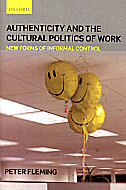Authenticity and the Cultural Politics of Work:
New Forms of Informal Control
|
|
Peter Fleming
|

|

The 'personal' was once something to be put to one side in the work place: a 'professional manner' entailed the suppression of private life and feelings. Now many large corporations can be found exhorting their employees to simply be themselves.
This book critically investigates the increasing popularity of personal authenticity in corporate ideology and practice with recourse to the social changes wrought by alternative cultures. Examples such as the bands Nirvana and Radiohead, and that subversive investigation into the modern workplace, the movie Office Space, are used to show how many modern corporations have attempted to accommodate such alternative, anti-authoritarian, cultural influences. Rather than have workers adhere to depersonalising bureaucratic rules or homogenous cultural norms, many large corporations now invite employees to simply be themselves. Alternative lifestyles, consumption, ethics, identity, sexuality, fun, and even dissent are now celebrated since employees are presumed to be more motivated if they can just be themselves.
Does this freedom to express one's authenticity in the workplace finally herald the end of corporate control? To answer this question, the author places this concern with authenticity within a political framework and demonstrates how it might represent an even more insidious form of cultural domination. The book especially focuses on the way in which private and non-work selves are prospected and put to work in the firm.
The ideas of Hardt and Negri and the Italian autonomist movement are used to show how common forms of association and co-operation outside of commodified work are the inspiration for personal authenticity. […]
Peter Fleming is Professor of Organization Theory at Queen Mary College, University of London. […] His research has focused on the changing nature of the corporate power relations and the types of resistance that challenge corporate domination. These ideas are summarised in the book co-authored with Andre Spicer Contesting the Corporation: Power, Resistance and Struggle in Organizations (2007, Cambridge University Press). He has also researched corporate corruption and published the book Charting Corporate Corruption: Agency, Structure and Escalation (2009, Edward Elgar Press).
|
|
